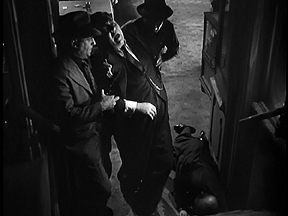When people talk about old movies, they often refer to various flicks as being "dated" or, conversely, as having "held up well". Noir feels, and certainly looks, like a product of its time. Neo-noir continually updates the style, but the originals still mean a lot to a lot of people, and they are still the ideal to which neo-noir refers. In short, these 40s-50s movies are, more often than not, dated but hold up anyway. Why's that? They
are by nature pessimistic. A lot of them take a sunny turn in the
last five minutes, but most of the endings that go that way have
a tacked-on vibe, and the take-home impression of these movies
in their
total
is that things aren't right,
that people at the bottom of the heap are brutally dense, and people
at the
top are grossly corrupt, and that all of them are perverse.
Question is, why should an outlook such as this continue to attract so much attention... devotion, even? First off, not everyone likes noir. These devotees are a niche not a mass audience. This means filmmakers have a more than average amount of latitude when it comes to walking on the dark side, though how much latitude they choose to take varies quite a bit. Secondly, noir isn't just existential angst. It's mystery and danger, the stuff of involuntary fascination. But noir isn't primarily about action either. Noir movies aren't really thrillers, although the line between neo-noir and thriller can be vague and the overlap considerable. Core noir (40s, 50s) is generally about people sorting through a mass of confusing information in an attempt to find a center, a thread, a foothold. Noir proceeds more on talk than action, which is why a lot of contemporary viewers, raised on hyper edits and explosions, find it slow going.
And not just when things go blatantly bad and everyone can see for themselves, but before that and later when everything has been tidied up and most of us are comfy and don't want to hear about it. But this decay doesn't happen all of a sudden like our recognition of it. It takes deal on top of phony deal, shell game after shell game. Decay takes time. And it takes a profound corruption that justifies itself as it goes. As long as money is being generated, justification comes easy.
Noir knows.
screenshots,
top to bottom: |

 How
to explain the
persistence of
How
to explain the
persistence of  And
it's going to take a lot more than plot manipulation to clean up
this
mess. Not that these flicks are pushing some sort of revolution.
The attitude is generally fatalistic. "Well," these movies
seem to say, "Maybe
if you're true to yourself, that's something. Maybe if you show a
little style, that's O.K. too. But anything more than that and you're
a sucker. Anything more than that and they'll grind you up or, worse
yet, co-opt you." It's
a loner's view, the view of someone who doesn't have much of a stake
in the future.
And
it's going to take a lot more than plot manipulation to clean up
this
mess. Not that these flicks are pushing some sort of revolution.
The attitude is generally fatalistic. "Well," these movies
seem to say, "Maybe
if you're true to yourself, that's something. Maybe if you show a
little style, that's O.K. too. But anything more than that and you're
a sucker. Anything more than that and they'll grind you up or, worse
yet, co-opt you." It's
a loner's view, the view of someone who doesn't have much of a stake
in the future. When
recently our financial institutions were exposed as slimy pretty
much from top to bottom and the average citizen gasped in horror,
I should think most noir fans exhaled a sigh of recognition. This
exposure isn't just about the failure of certain institutions; it's
about a rottenness of the soul. That's why when the dust settles,
we'll do this again like we've done it before. Noir is still around
because this is the story it tells, and it's always relevant.
When
recently our financial institutions were exposed as slimy pretty
much from top to bottom and the average citizen gasped in horror,
I should think most noir fans exhaled a sigh of recognition. This
exposure isn't just about the failure of certain institutions; it's
about a rottenness of the soul. That's why when the dust settles,
we'll do this again like we've done it before. Noir is still around
because this is the story it tells, and it's always relevant. Film
noir is usually about individuals rather than organizations, but
the social order is always there like a blurry background projection;
and its representatives weave in and out of the plot: the lawyer
in The
Postman Always Rings Twice, the businessman in The Asphalt
Jungle,
the police chief in Diva.
Film
noir is usually about individuals rather than organizations, but
the social order is always there like a blurry background projection;
and its representatives weave in and out of the plot: the lawyer
in The
Postman Always Rings Twice, the businessman in The Asphalt
Jungle,
the police chief in Diva.